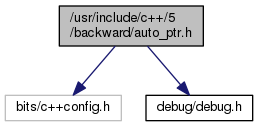This is an internal header file, included by other library headers. More...

Functions | |
| namespace std | _GLIBCXX_VISIBILITY (default) |
This is an internal header file, included by other library headers.
Do not attempt to use it directly. {memory}
| namespace std _GLIBCXX_VISIBILITY | ( | default | ) |
A wrapper class to provide auto_ptr with reference semantics. For example, an auto_ptr can be assigned (or constructed from) the result of a function which returns an auto_ptr by value.
All the auto_ptr_ref stuff should happen behind the scenes.
A simple smart pointer providing strict ownership semantics.
The Standard says:
Anauto_ptrowns the object it holds a pointer to. Copying anauto_ptrcopies the pointer and transfers ownership to the destination. If more than oneauto_ptrowns the same object at the same time the behavior of the program is undefined.
The uses ofauto_ptrinclude providing temporary exception-safety for dynamically allocated memory, passing ownership of dynamically allocated memory to a function, and returning dynamically allocated memory from a function.auto_ptrdoes not meet the CopyConstructible and Assignable requirements for Standard Library container elements and thus instantiating a Standard Library container with anauto_ptrresults in undefined behavior.
Quoted from [20.4.5]/3.
Good examples of what can and cannot be done with auto_ptr can be found in the libstdc++ testsuite.
_GLIBCXX_RESOLVE_LIB_DEFECTS
The pointed-to type.
An auto_ptr is usually constructed from a raw pointer.
| __p | A pointer (defaults to NULL). |
This object now owns the object pointed to by __p.
An auto_ptr can be constructed from another auto_ptr.
| __a | Another auto_ptr of the same type. |
This object now owns the object previously owned by __a, which has given up ownership.
An auto_ptr can be constructed from another auto_ptr.
| __a | Another auto_ptr of a different but related type. |
A pointer-to-Tp1 must be convertible to a pointer-to-Tp/element_type.
This object now owns the object previously owned by __a, which has given up ownership.
auto_ptr assignment operator.
| __a | Another auto_ptr of the same type. |
This object now owns the object previously owned by __a, which has given up ownership. The object that this one used to own and track has been deleted.
auto_ptr assignment operator.
| __a | Another auto_ptr of a different but related type. |
A pointer-to-Tp1 must be convertible to a pointer-to-Tp/element_type.
This object now owns the object previously owned by __a, which has given up ownership. The object that this one used to own and track has been deleted.
When the auto_ptr goes out of scope, the object it owns is deleted. If it no longer owns anything (i.e., get() is NULL), then this has no effect.
The C++ standard says there is supposed to be an empty throw specification here, but omitting it is standard conforming. Its presence can be detected only if _Tp::~_Tp() throws, but this is prohibited. [17.4.3.6]/2
Smart pointer dereferencing.
If this auto_ptr no longer owns anything, then this operation will crash. (For a smart pointer, no longer owns anything is the same as being a null pointer, and you know what happens when you dereference one of those...)
Smart pointer dereferencing.
This returns the pointer itself, which the language then will automatically cause to be dereferenced.
Bypassing the smart pointer.
You can get a copy of the pointer that this object owns, for situations such as passing to a function which only accepts a raw pointer.
Bypassing the smart pointer.
You can get a copy of the pointer that this object owns, for situations such as passing to a function which only accepts a raw pointer.
Forcibly deletes the managed object.
| __p | A pointer (defaults to NULL). |
This object now owns the object pointed to by __p. The previous object has been deleted.
Automatic conversions
These operations convert an auto_ptr into and from an auto_ptr_ref automatically as needed. This allows constructs such as
References __glibcxx_function_requires, and _GLIBCXX_DEBUG_ASSERT.